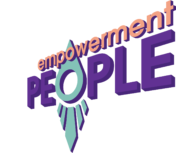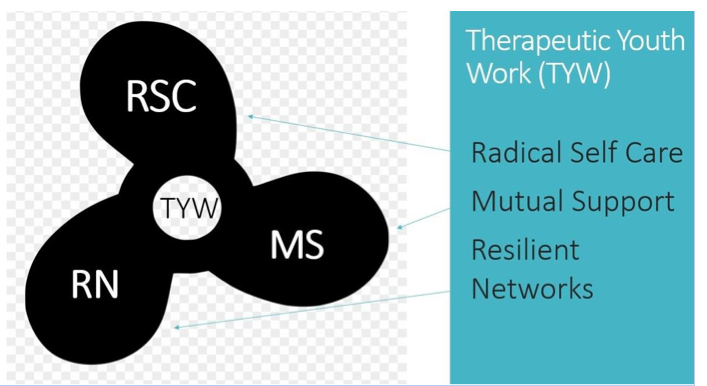The Empowerment People are working together with the brilliant M13 Youth Project (M13) on The Sistering Project to enhance the development of Therapeutic Youth Work practice.
The project focuses on developing radical self-care, mutual-care and resilient networks as part of the Therapeutic Youth Work model, using creative and therapeutic conversations and activities that foster positive peer group relationships between the young women and between the young women and workers.
The model has been created by Sally Carr and sits within a practice of Therapeutic Youth Work developed by her. It centres on the values, principles and ethics of youth work alongside the three core conditions of Carl Rogers’ Person-Centred approach; empathy, congruence and unconditional positive regard. The focus of the practice concentrates on developing conversations, relationships, activities and environments that ensure a therapeutic alliance in a Youth Work context is created. Harnessing relationships as a critical resource, Therapeutic Youth Work advances higher levels of networked resilience, which is a greater strength than expecting resilience to reside solely in the individual, and adds to community mutual support and deliberate radical self-care for young people.
The model is neither hierarchical nor sequential, and seeks to enable young people to develop radical practices, alongside Therapeutic Youth Workers, that change the contexts and relationships that have often reinforced the restrictive quad of discrimination, disadvantage, trauma and poverty; and in doing so ensures that young people are not returned to circumstances that often leave them isolated and managing their own oppression.
By recognising that “structural inequalities which are often invisible … determine who can access resource and flourish” (Nussbaum, 2011 in Cottam 2020.p25), Therapeutic Youth Work contributes to changing this. It highlights and disrupts these inequalities by enabling young people to create trusting and powerful relationships that provide support, enrich resources, and build resilient networks that support transformational systems change.
The practice of Therapeutic Youth Work takes the practitioner beyond a Trauma Informed Approach (SAMHSA 2014), to a Healing Centred Approach. “ A healing centered approach is holistic involving culture, spirituality, civic action and collective healing. A healing-centered approach views trauma not simply as an individual isolated experience, but rather highlights the ways in which trauma and healing are experienced collectively.” (Ginwright 2018 )
Therapeutic Youth Work practice uses an empowering coaching style, alongside Practices of Hope (Snyder, 2002), to promote post-traumatic growth, and seeks deliberate change in the structures and systems that often limit young people’s lives.

The Sistering Project is managed by M13 and staffed by their youth workers: community-rooted, female, qualified professionals, who listen carefully and respectfully and who don’t judge, blame, stigmatise or dismiss. These known and trusted adults are regularly available in the young women’s community, accessible in the weekly Young Women’s Sistering Group, and also at other times of the week. The project is located in a safe and accessible venue in the heart of their community, and delivered in a safeguarded and boundaried way, through a weekly group meeting, phone calls, text messaging, meetups, and practical help such as accompanying a young woman to specialist services. This approach enhances the resilience of the network and seeks to reduce isolation, instead creating positive mutual community support.
Young women can join the project at any time, participate at the level they feel comfortable with and can leave when they want to, so they remain in control of their participation and the pace of the work.
“As a result of this, we have developed our work to take account of young women’s mental health difficulties and to work in trauma-informed ways to create a safe and welcoming environment for young women to meet in, relax, talk and engage in activities determined by them; using non-directive counselling skills to listen carefully to support young women to identify and talk about the things that concern them and to explore what action they can take” Dr H Gatenby (2021) M13 Youth Project Manager
At M13 the workers curate a psychologically safe and low-risk environment that pays attention to the specific age- and gender-related rights, lived experiences and needs of young women, to enable them to control the level of information they share with each other and workers. This builds trust, and enables deeper work through time.
“Our work is person centred and does not judge, stigmatise or blame young women. We build self-esteem and confidence by being available to young women: in the community, in groups and one-to-one; enjoying their company, giving them our full attention and focusing on them rather than a ‘task’, helping them to identify their own positive qualities, enabling them to speak positively about themselves and others and modelling how to be a kind friend to themselves” Gatenby (2021)
The project supports young women experiencing increasingly entrenched mental health difficulties to:
• meet with their peers, professionally qualified youth workers and a counsellor;
• be welcomed and valued in a safe, hopeful, creative, therapeutic and supportive community;
• talk and be listened to;
• engage in creative and therapeutic conversations and activities, determined by the young women, which help them to reconnect with themselves and their hopes for their future, and to consider and work out their ‘next step’;
• receive mental health support from experienced youth workers, a qualified counsellor and each other;
• receive holistic and practical support on the wider issues that concern them, from experienced youth workers and each other; and
• to have fun in a trauma-informed space of safety, where they can relax and ‘let their guard down’.
“Our trauma-informed support pays attention to the location of our activities and the physical environment we create to ensure young women feel safe attending our provision. We also pay particular attention to the ‘social and emotional’ environment workers foster and curate in the groups, to ensure young women feel psychologically safe and to reduce the likelihood of re-traumatising/ triggering young women. This requires workers themselves, with the support of M13, to engage in positive-self and mutual care, and to build and participate in professional networks that support their resilience.” Gatenby (2021)
The social pedagogical approach that Therapeutic Youth Work builds on seeks to develop peer support and foster growth, both in the individual and through mutuality. The black author and activist Audre Lorde informs us that “it is learning how to take our differences and make them strengths. For the master’s tools will never dismantle the master’s house. They may allow us temporarily to beat him at his own game, but they will never enable us to bring about genuine change” (Lorde 1984:2). This is where Therapeutic Youth Work co-creates change alongside young people, understanding their trauma and seeking to change the structures that maintain it through disrupting them, at times dismantling them, and ultimately making changes that are inclusive, intersectional and more equitable.
For more information about Therapeutic Youth Work contact: sally@empowermentpeople.org.uk
Or about M13 and the Sistering Project contact: helen@m13youthproject.org.uk
References:
Carr. S. and Hanbury. A. ( 2022 ) LGBTQ+ young peoples’ Sexuality and Gender Citizenship in digital spaces in Young People Radical Democracy and Community Development, Edited by: Janet Batsleer, Harriet Rowley and Demet Lukuslu. To be published by The Bristol University Press, University of Bristol 2022.
Cottam, H. (2020). Welfare 5.0: Why we need a social revolution and how to make it happen. UCL Institute for Innovation and Public Purpose, Policy Report, (IIPP WP 2020-10). https://www.ucl.ac.uk/bartlett/public-purpose/wp2020-10
Ginwright, Shawn 2018. https://ginwright.medium.com/the-future-of-healing-shifting-from-trauma-informed-care-to-healing-centered-engagement-634f557ce69c#:~:text=A%20healing%20centered%20approach%20is,and%20healing%20are%20experienced%20collectively. (accessed 13.3.22)
IYW https://iyw.org.uk/wp-content/uploads/2020/07/IYW-Code-of-Ethics-Poster-PDF.pdf (accessed 13.3.22)
Lorde, A. (1984) . “The Master’s Tools Will Never Dismantle the Master’s House.” Sister Outsider: Essays and Speeches. Ed. Berkeley, CA: Crossing Press. 110-114. 2007
Rogers, C. (1957). The necessary and sufficient conditions of therapeutic personality change. Journal of Consulting Psychology, Vol. 21(2), pp.95-103.
Snyder, C. R. (2002). Hope theory: Rainbows in the mind. Psychological Inquiry, 13(4), 249-275
Additional reading on Youth Work:
Sapin, K. (2013) Essential Skills for Youth Work Practice (2nd edn), London: Sage.
Banks, S. (2010) Ethical Issues in Youth Work, London: Routledge
Davies, B. (2005) ‘Youth Work: A Manifesto For Our Times’, Youth & Policy, 88: 5-27.
Download this page as PDF – Therapeutic Youth Work

